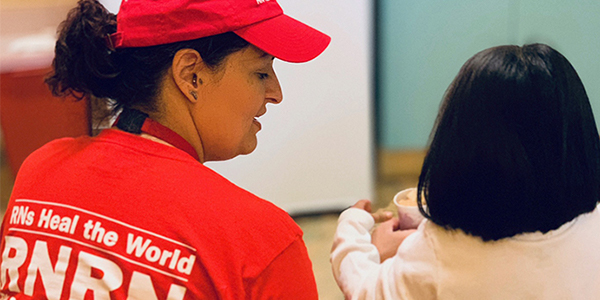Press Release
Nurses volunteering medical services Easter weekend to migrants recently released from federal detention

Nurse volunteers with the Registered Nurse Response Network (RNRN), a disaster-relief project of the California Nurses Foundation (CNF) and National Nurses United (NNU), say they are providing medical care for unprecedented numbers of migrant families recently released from federal detention.
In February, when RNRN first started sending teams of volunteer nurses to the area each weekend, nurses were assessing about 40 to 60 patients each day. Now, nurses are seeing upwards of 100 people each day, and on April 14, the site was at maximum capacity with a census of 448 people.
"We've all seen the news reports of overcrowding and migrant families being held behind fences under freeway overpasses," said Cathy Kennedy, a Sacramento RN and NNU vice president who has volunteered in Tucson. “We need to make sure that we provide any type of medical and mental care and support that we can. We need to listen to their stories and provide some gentleness and kindness. It's just the right thing to do." Kennedy noted that the vast majority of migrant families are fleeing extreme poverty, widespread violence, and political repression, conditions that were brought on in part because of U.S. policies.
This 12th team of RNRN nurse volunteers will be available for interview in Tucson from April 19 through April 21. They are providing medical aid at the Casa Alitas shelter operated by Catholic Community Services of Southern Arizona, which has provided assistance to more than 2,000 migrant families since October 2018. Including this weekend’s team, RNRN has now deployed a total of 26 RNs from 11 states including Arizona, Florida, Louisiana, Maryland, Maine, Nebraska, New Mexico, and Texas. RNRN will continue to send nurse volunteers through the end of May.
Nurses returning from past deployments have expressed great concern about the harsh and unhealthy conditions children and their parents are facing in federal detention, conditions that have led to the deteriorated medical states of some migrants.
Migrants and asylum seekers have shared with nurses on deployment in Tucson, that they are often housed in fenced cages with concrete floors, in very cold temperatures without adequate bedding or clothing for warmth. Nurses from previous RNRN deployments said that they have heard repeated stories of medications being confiscated or denied to those in custody, including medications for children with serious conditions, such as asthma inhalers and anti-seizure medications.
In addition, the nurses are distressed by migrants’ reports that they are being held for days without access to adequate food, clean water, or opportunity to bathe. One family with a bottle-fed baby recently told nurses that federal authorities confiscated all their baby bottles and formula. They arrived at the shelter with no bottles and one diaper. Nurses note that migrants nearly always arrive at the shelter very hungry and suffering from dehydration. When the families arrive, they are immediately offered water, fruit, and soup.
"It’s unimaginable to conceive what kind of situations these families are escaping if they feel risking their lives and their children in such a torturous journey is a better option or solution," said Jessica Rose, a local Arizona RN who herself is the child of immigrant parents and has volunteered multiple times at Casa Alitas. "The families we were able to help through the RNRN deployment come not only with stories of extreme poverty and fear, but stories filled with dreams and motivation drawn from hope and an opportunity to survive and thrive. As a nurse, I have a sense of responsibility for everyone when I see with my own eyes the needs of the people migrating.”
RNRN volunteer nurses have cared for thousands of patients during disaster relief and humanitarian assistance deployments that include the South Asian tsunami (2004); Hurricanes Katrina and Rita (2005); the Haiti earthquake (2010); Hurricane Sandy (2012); Super Typhoon Haiyan/Yolanda (2013); Hurricanes Harvey and Maria (2017); Vulcan de Fuego Relief in Guatemala (2018), Hurricane Michael (2018); the Camp Fire in Butte County, Calif. (2018); and the Continuing Promise 2010 and 2015 humanitarian missions with the Department of Defense. RNRN volunteers have also provided first aid and basic response services to hundreds of community events across the country, as well as rotating teams who assisted the water protectors in Standing Rock in 2016.
RNRN is powered by CNF and NNU, the largest union and professional organization of registered nurses in the United States with more than 150,000 members.